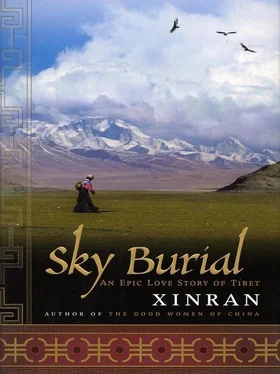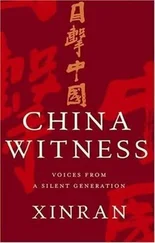It was the older woman who broke the silence.
“You know, don’t you, that the fighting between the Chinese and Tibetans ended long ago?” she asked.
Wen didn’t reply, although her mind was reeling from this information. There seemed no way to communicate to these people the kind of isolated life she had experienced. They knew next to nothing about the empty plains of Qinghai or the nomadic way of life. Though they lived in Tibet, they remained enclosed in their Chinese communities. How could she tell them that she had been living in a place where there were no politics, no war, only the calm self-sufficiency of a communal life where everything was shared-and limitless space, where time stretched out endlessly.
“Please tell me,” she asked, “what is the situation now between the Chinese and the Tibetans?”
The woman and her friends looked at each other.
“In the time you have been in Tibet,” the woman said, “China has changed greatly. Perhaps more than you can guess. It is difficult for us to know exactly what is happening in Tibet and why the Dalai Lama is no longer here.”
Since her conversations with Zhuoma all those years ago, Wen had not given much thought to the Dalai Lama, but she was nevertheless shocked to learn that he wasn’t living in the Potala Palace as she had imagined.
“But why did he leave?” she asked.
“I don’t know,” said the woman. “I’ve heard people say that relations between the Chinese government and the Dalai Lama were pretty good to begin with-and that, in the early 1950s, the Communist government had the support of the Tibetan people and the approval of the Tibetan elite. Otherwise, why would the Dalai Lama, who had gone into hiding in the tiny remote border village of Yadong, have returned to the capital, Lhasa? And why would he have sent representatives to Beijing in 1951 to sign the Communist government’s Agreement for the Peaceful Liberation of Tibet, making Tibet an autonomous region of China? Apparently the Dalai Lama’s meeting with Chairman Mao Tse-tung in 1954 was very friendly and the Dalai Lama was impressed by Mao’s intelligence and ability. The poem he wrote in praise of Chairman Mao and the Golden Wheel of a Thousand Blessings, which he presented to Beijing, are said to be proof of this. In that year, both he and the Panchen Lama accepted the mandate of the Chinese government at the National People’s Congress, which showed that Tibet endorsed the Beijing regime.”
“Some people say that,” the older man interrupted, “but others believe the Dalai Lama was young and impressionable. The Beijing government brainwashed him. But, although they might have managed to influence his emotions over minor issues, they could never have made him relinquish his belief in Tibet’s independence. People may say that in the early 1950s Mao had no intention of using force in Tibet and that he knew better than to interfere with the way the Tibetans governed themselves, but would he have tolerated an independent Tibet? It is easy to understand why he sent in the army in 1958. There was unrest in the southwest of China and Chiang Kai-shek had announced that he was building up his forces in Taiwan to launch an attack on the Communists. It was essential that Mao had Tibet under his control. The only reason he had been so easy on Tibet after 1949 was because the Korean War had diverted the manpower and resources of the Liberation Army elsewhere. But by the end of the 1950s, the Liberation Army had had a few years to recover its strength and was ready to deal with Tibet. The Dalai Lama was accepting weapons from the West and giving tacit support to the Tibetan Independence Movement. Mao had no choice but to send in the army.”
The woman spoke again. “Who can know the truth? The Dalai Lama was torn in half. On the one hand, the Chinese government’s promise to allow Tibet to opt out of their reform movement was being broken. Political campaigns such as ‘Kill the rich, help the poor,’ ‘Universal equality,’ and ‘Zero tolerance of religion’ were undermining the authority of Tibet’s feudal overlords, and shaking the Dalai Lama’s trust in Beijing. On the other hand, he did not want to anger Beijing. So he tried to play both games: he took an active role in the political projects initiated by the Chinese government while turning a blind eye to the Tibetan Independence Movement’s efforts to stir up military rebellion through the Army of Defenders of the Faith. But he was like a man standing in two boats at the same time: he ended up with nothing. Beijing sent its soldiers to destroy the age-old unity of church and state in Tibet, while the Army of Defenders of the Faith, despite Western support, was unable to protect the Dalai Lama’s throne. In his haste to flee, the Dalai Lama didn’t even dare wear his own clothes. He’d been told by reliable sources that the Liberation Army in Tibet was planning to take him prisoner as punishment for trying to break with China. That was why so many Tibetans kept guard around the Potala Palace, to protect their spiritual leader-the incident that Beijing blamed as the ‘trigger’ that set off the unrest.”
The young man and woman in the group had been very silent up to this point. Now the young man asked, “But if the Dalai Lama’s flight was so sudden, why were there so many rumors about the treasure from the Potala Palace being taken out of the country one or two years before all this blew up, and how come the Dalai Lama has had all his treasure with him in exile? The late Chinese premier Zhou Enlai said that there was a godlike aspect to the Dalai Lama when he lived in the Potala Palace, but when a god leaves his temple, his air of holiness is tarnished. I think that now the Dalai Lama is no longer in Tibet, he has given up his struggle for independence.”
“I am not sure that you are right,” the older woman said. “I think he longs to return. Because of his efforts more and more people in the outside world are starting to take notice of Tibet. The government tells us that they have tried many times to hold a dialogue with the Dalai Lama, but he has always refused any contact. Many Tibetan people I talk to tell me the opposite. What should we believe?”
She turned to Wen with a sad smile.
Wen’s head was reeling. Never before had she heard a political conversation like this one. When she was young, she had been inspired by political ideals, but she and her friends had all believed the same thing. She wasn’t sure she would ever untangle all the confusing information she had just been given. The truth, she thought, would always remain elusive because humans could never recover the past as it had actually happened.
It was getting late as the group walked down the hillside. Far more important to Wen than knowing about politics was finding her husband. Before she separated from these people, she was determined to find out if they could help her. But none of them had much practical advice to offer. They themselves, they said, had difficulty receiving letters from China.
“Perhaps if you go to Lhasa,” the woman said, “the army officials there will have more information, or help you go back to China.”
Wen thanked her. Although she longed with all her heart to return to Suzhou and to fold her parents and her sister in her arms, she knew that until she had some news of Kejun and Zhuoma she could not leave Tibet. She then watched the first Chinese people she had met in many years walk away from her. For a moment, she was tempted to run after them, but she stopped herself. She did not belong with them now. Ge’er and Pad were her family.
WHEN SHE returned to her room at the guesthouse, she found a lama sitting outside the door on the ground, telling his prayer beads. When he saw her, he looked up.
“I am told you are looking for a woman named Zhuoma.”
Читать дальше












